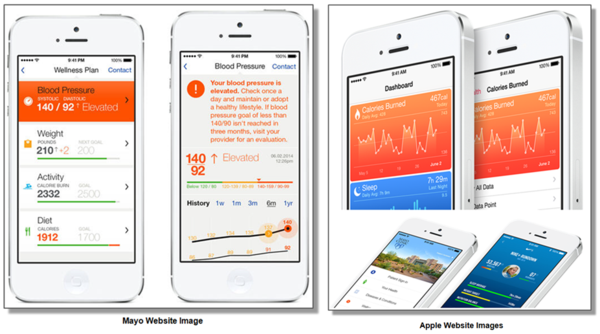September 15, 2014
Apple is on the cusp of launching clinical trials with diabetics and chronic disease patients using their patented HealthKit app, as they prepare to launch their vision that could streamline the process of sharing medical information.
Apple has partnered with Stanford University Hospital and Duke University Hospital as they look to begin rolling out their HealthKit platform, an app that could create a sort of health dashboard. HealthKit works by gathering data from a multiple of sources, and pooling them together in a central location to facilitate analysis of health metrics. Regulated medical devices such as glucose monitors, heart and respiratory monitors, and other medical devices can all connect to Apple's platform and constantly stream data that can be made available to healthcare professionals for monitoring purposes.
HealthKit will make its official debut on September 17, is "already helping top hospitals fight cancer, diabetes," said Cult of Mac recently. Forbes fired back that neither Stanford nor Duke have confirmed that a substantial number of patients are involved in the trials.
While details of the trials are hazy thus far, here's what we know so far: In early trials at Stanford University hospital, young patients with Type 1 diabetes were sent home with an iPod touch to monitor blood sugar levels between doctor visits. Apple has also partnered with healthcare software company Epic Systems Corp, who provides medical information services to many hospitals around the company. HealthKit will help connect patients and doctors by seamlessly streaming the data provided by these take home medical devices, and plugging the data into the network of your primary care physician, allowing them to effortlessly monitor and assess the data for potential health risks.
|
HealthKit is now being tested by clinicians at Stanford and Duke. |
Meanwhile, Duke University physicians have been developing a pilot to track blood pressure, weight, and other measurements for patients with cancer or heart disease. Doctors have even begun working on specific alerts that will help them flag potentially dangerous readings, allowing doctors to notify their patients when serious health risks are present. It could also significantly help eliminate any errors of oversight made by patients when manually entering or reporting their health data to physicians.
Apple mentioned the details last week in a news release for iOS 8, the latest version of their operating system for phones and tablets. Apple's aim is to eventually broaden their network of health care providers across the U.S. in an effort to improve how we share medical information with our primary healthcare providers. The effects of which could potentially lead to lower healthcare costs while helping users actively improve their health.
While HealthKit intends to streamline the process of data-sharing between physicians and patients, the rising concern has been the potential risks of sharing personal, sensitive medical information on a daily basis between mobile devices. Many fear that having so much private information stored in one central location could be a potential hacking disaster waiting to happen. While the fears have been well documented, Apple continues to take steps toward ensuring the secure transit and storage of any and all sensitive medical information.
According to an article from reuters, Apple is considering creating a "HealthKit Certification" for third party developers with specific conditions stipulating how data must be securely stored on devices, while also forbidding the sale of any personal information to advertisers.
Despite much of the minutiae still left to be sorted out, early clinical trials are already showing significant promise, paving the way for Apple's HealthKit platform to make big waves once the lingering wrinkles get ironed out.
Refresh your medical device industry knowledge at MD&M Chicago, October 15-16, 2014, and MD&M Minneapolis, October 29-30, 2014. |
Kristopher Sturgis is a contributor to Qmed and MPMN.
Like what you're reading? Subscribe to our daily e-newsletter.
About the Author(s)
You May Also Like



